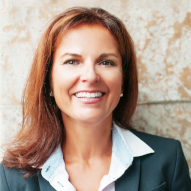Prof. Dr. Melanie Walter-Rogg has been a professor at the University of Regensburg since 2011. There she teaches Political and Social Science. The methods of the two subjects are in particular focus, which also includes the areas of Big Data and Machine Learning.
Prof. Walter-Rogg’s university career began with studying Political Science, Sports Science and German language and literature at the University of Stuttgart. Before doing her doctorate on the subject of “Political Power and Responsiveness in the Big City – A Study of Attitude Congruence among Local Political Actors Using the Example of the City of Stuttgart” in 2001, she worked for a long time as a research assistant. After several years of working as a research assistant at the Institute for Social Sciences at the University of Stuttgart and as a lecturer for special tasks at the Institute for Political Science at the LMU Munich, she came to Regensburg in 2011.

Professorship for Political Science with focus on methods
- SS 2018: The training research project on the state election 2018 in Bavaria (Twitter analysis of the political communication of Bavarian parliamentarians)
- SS 2019: Introduction to Computational Social Science (with workshop sessions on the topics of Big Data Analysis and Agenda based social simulation)
- WS 2019/20: Introduction in Social Network Analysis with R (highly application-oriented with individual and group projects)
- WS 2019/20: Introduction in Big Data Analysis with R (highly application-oriented with individual and group projects)
- SS 2020: Introduction in Social Network Analysis with R (highly application-oriented with individual and group projects
- SS 2020: Introduction in Big Data Analysis with R (highly application-oriented with individual and group projects)
- WS 2020/21: Introduction in Big Data Analysis with R (highly application-oriented with individual and group projects)
- Influence of federal politics on the state election campaign in Bavaria 2018 – An investigation of political communication on Twitter
- Facing ‚Jamaika‘ – Analyzing the Twitter Behavior of German Politicians during the Exploratory Talks
- Voting-with-the-feet: An analysis of the tiebout model using agent-based modeling
- Structures of radical narratives in social online networks using the example of the “Contraculture Halle”
- Agreement of the thematic agendas of political parties and citizens as a success factor in the state elections in Bavaria in 2018 – A comparison of political election programs and the social media activities of parties and citizens
- Deprivation, protest and refugees: a mixed method analysis of the motives of AfD voters and the AfD’s topics in the Bavarian election 2018
- Theoretical knowledge of the field of Computational Social Science
- Software know-how and application in the area of agent-based modeling, network analysis, Big Data analysis
- Environmental Performance in Democracies and Autocracies
- Democracy Qualities in Comparative Climate Policy Research
- The Decline of Trust in German Politicians and its Consequences for Democratic Institutions
- European election campaign 2019: The effect of door-to-door visits and regional candidates
- University study Bavaria election USBW18
- Walter-Rogg, Melanie/Heinrich, Tassilo (Hrsg.) 2021: Die Landtagswahl 2018 in Bayern – Analysen zum Wahlverhalten und zur politischen Kultur im Freistaat. Wiesbaden: Springer VS.
- Individually Salient Switching Motives and Macro-Voter Transitions: The Case of the Immigration Issue Public in a Regional Earthquake Election in Germany 2018. Eingereicht beim Journal Political Behavior am 6.10.2020.
Ms. Walter-Rogg, thank you for taking the time to answer these questions. We wish you a nice day!